T117 ACC300 Group Assignment: Auditing Ethical Principles Review
VerifiedAdded on 2020/05/11
|10
|2458
|76
Homework Assignment
AI Summary
This assignment solution for ACC300 delves into the ethical considerations within auditing, focusing on scenarios where ethical principles, as outlined in APES 110, are potentially violated. The analysis covers breaches of confidentiality, professional behavior, objectivity, and independence, providing detailed explanations of each scenario and the relevant ethical implications. The assignment further explores the different types of audit opinions (unqualified, qualified, and adverse), based on the provided case studies, considering factors like limitations in the scope of the audit, non-disclosure of material information, and non-adherence to accounting standards. The solution provides a comprehensive review of auditing ethics and its impact on the auditor's responsibilities and the reliability of financial statements.
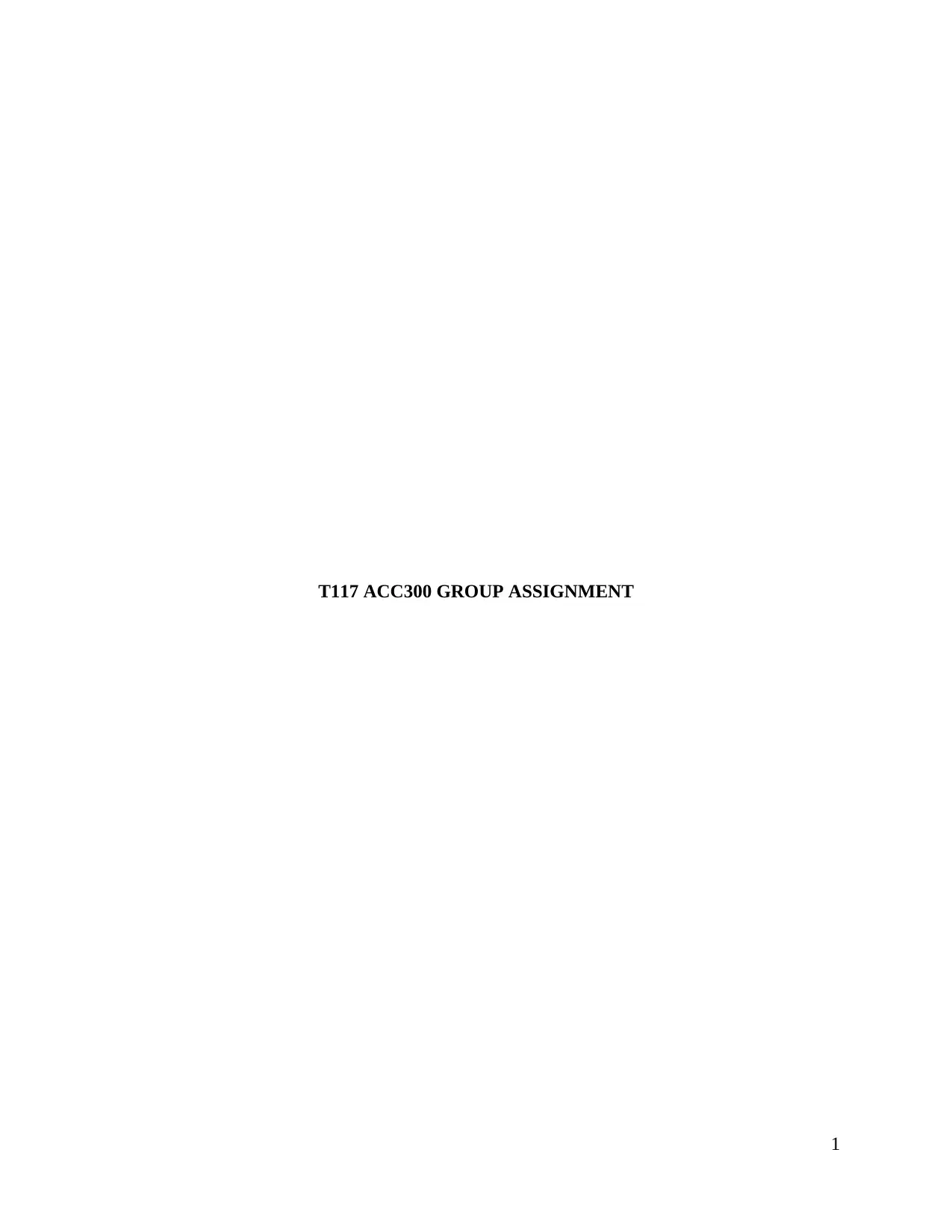
T117 ACC300 GROUP ASSIGNMENT
1
1
Paraphrase This Document
Need a fresh take? Get an instant paraphrase of this document with our AI Paraphraser
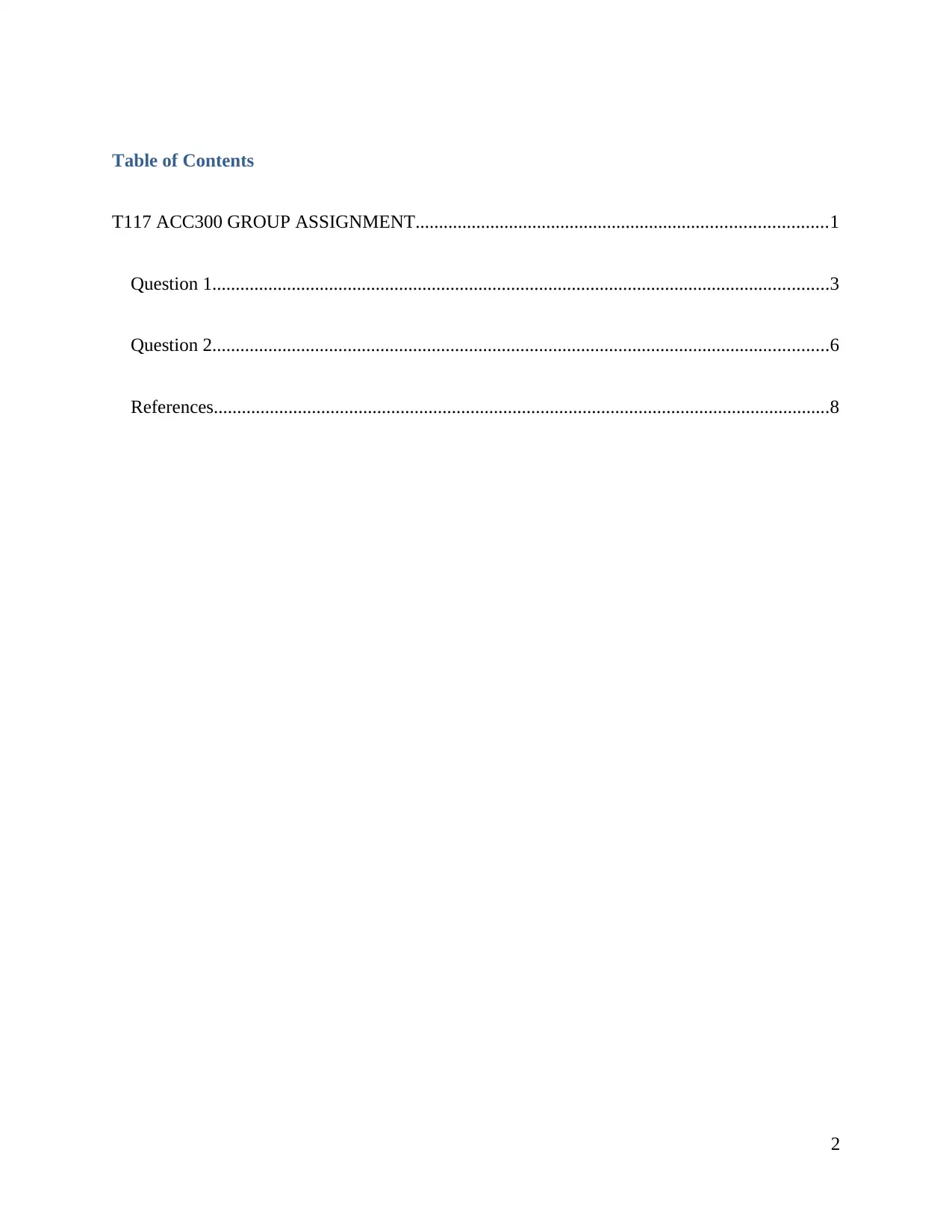
Table of Contents
T117 ACC300 GROUP ASSIGNMENT........................................................................................1
Question 1....................................................................................................................................3
Question 2....................................................................................................................................6
References....................................................................................................................................8
2
T117 ACC300 GROUP ASSIGNMENT........................................................................................1
Question 1....................................................................................................................................3
Question 2....................................................................................................................................6
References....................................................................................................................................8
2
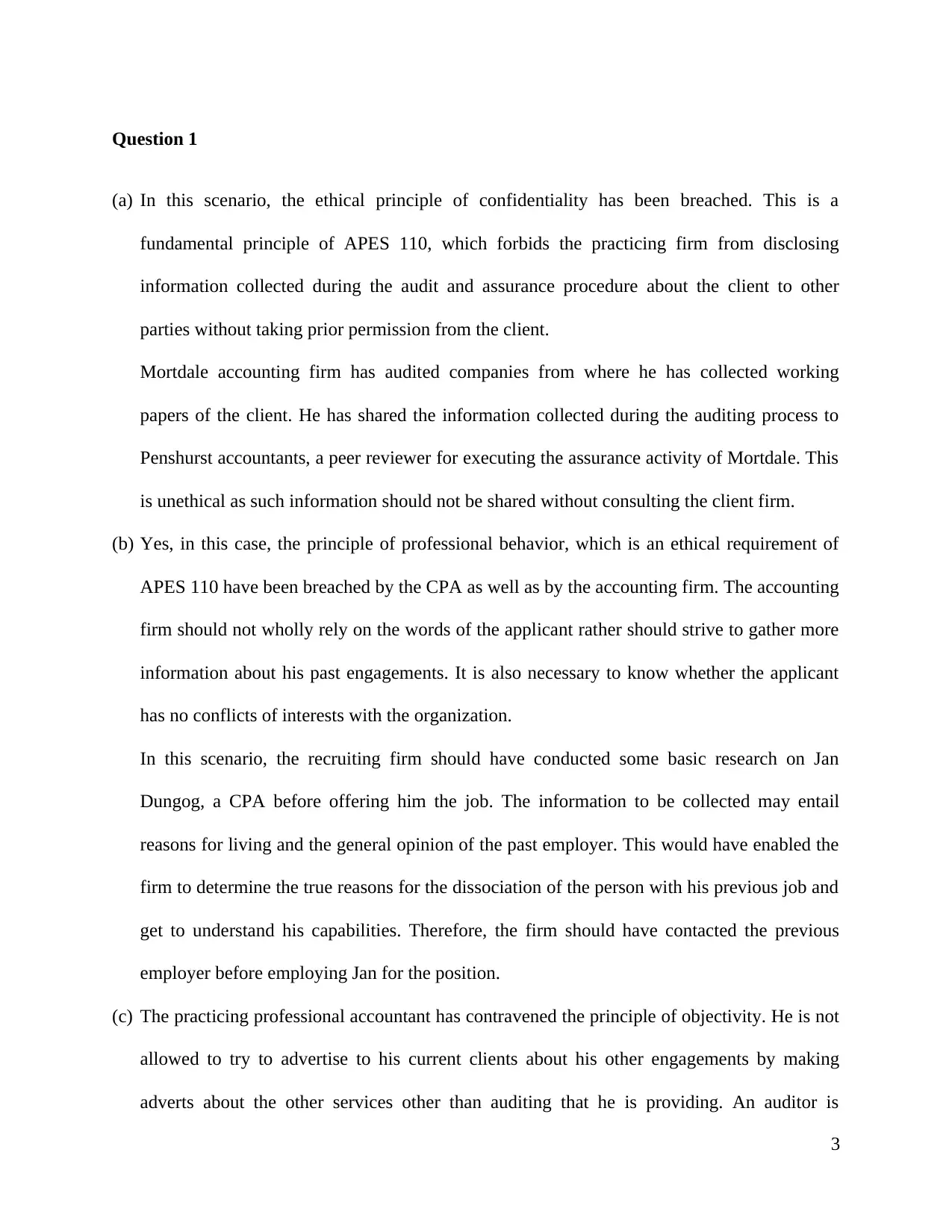
Question 1
(a) In this scenario, the ethical principle of confidentiality has been breached. This is a
fundamental principle of APES 110, which forbids the practicing firm from disclosing
information collected during the audit and assurance procedure about the client to other
parties without taking prior permission from the client.
Mortdale accounting firm has audited companies from where he has collected working
papers of the client. He has shared the information collected during the auditing process to
Penshurst accountants, a peer reviewer for executing the assurance activity of Mortdale. This
is unethical as such information should not be shared without consulting the client firm.
(b) Yes, in this case, the principle of professional behavior, which is an ethical requirement of
APES 110 have been breached by the CPA as well as by the accounting firm. The accounting
firm should not wholly rely on the words of the applicant rather should strive to gather more
information about his past engagements. It is also necessary to know whether the applicant
has no conflicts of interests with the organization.
In this scenario, the recruiting firm should have conducted some basic research on Jan
Dungog, a CPA before offering him the job. The information to be collected may entail
reasons for living and the general opinion of the past employer. This would have enabled the
firm to determine the true reasons for the dissociation of the person with his previous job and
get to understand his capabilities. Therefore, the firm should have contacted the previous
employer before employing Jan for the position.
(c) The practicing professional accountant has contravened the principle of objectivity. He is not
allowed to try to advertise to his current clients about his other engagements by making
adverts about the other services other than auditing that he is providing. An auditor is
3
(a) In this scenario, the ethical principle of confidentiality has been breached. This is a
fundamental principle of APES 110, which forbids the practicing firm from disclosing
information collected during the audit and assurance procedure about the client to other
parties without taking prior permission from the client.
Mortdale accounting firm has audited companies from where he has collected working
papers of the client. He has shared the information collected during the auditing process to
Penshurst accountants, a peer reviewer for executing the assurance activity of Mortdale. This
is unethical as such information should not be shared without consulting the client firm.
(b) Yes, in this case, the principle of professional behavior, which is an ethical requirement of
APES 110 have been breached by the CPA as well as by the accounting firm. The accounting
firm should not wholly rely on the words of the applicant rather should strive to gather more
information about his past engagements. It is also necessary to know whether the applicant
has no conflicts of interests with the organization.
In this scenario, the recruiting firm should have conducted some basic research on Jan
Dungog, a CPA before offering him the job. The information to be collected may entail
reasons for living and the general opinion of the past employer. This would have enabled the
firm to determine the true reasons for the dissociation of the person with his previous job and
get to understand his capabilities. Therefore, the firm should have contacted the previous
employer before employing Jan for the position.
(c) The practicing professional accountant has contravened the principle of objectivity. He is not
allowed to try to advertise to his current clients about his other engagements by making
adverts about the other services other than auditing that he is providing. An auditor is
3
⊘ This is a preview!⊘
Do you want full access?
Subscribe today to unlock all pages.

Trusted by 1+ million students worldwide
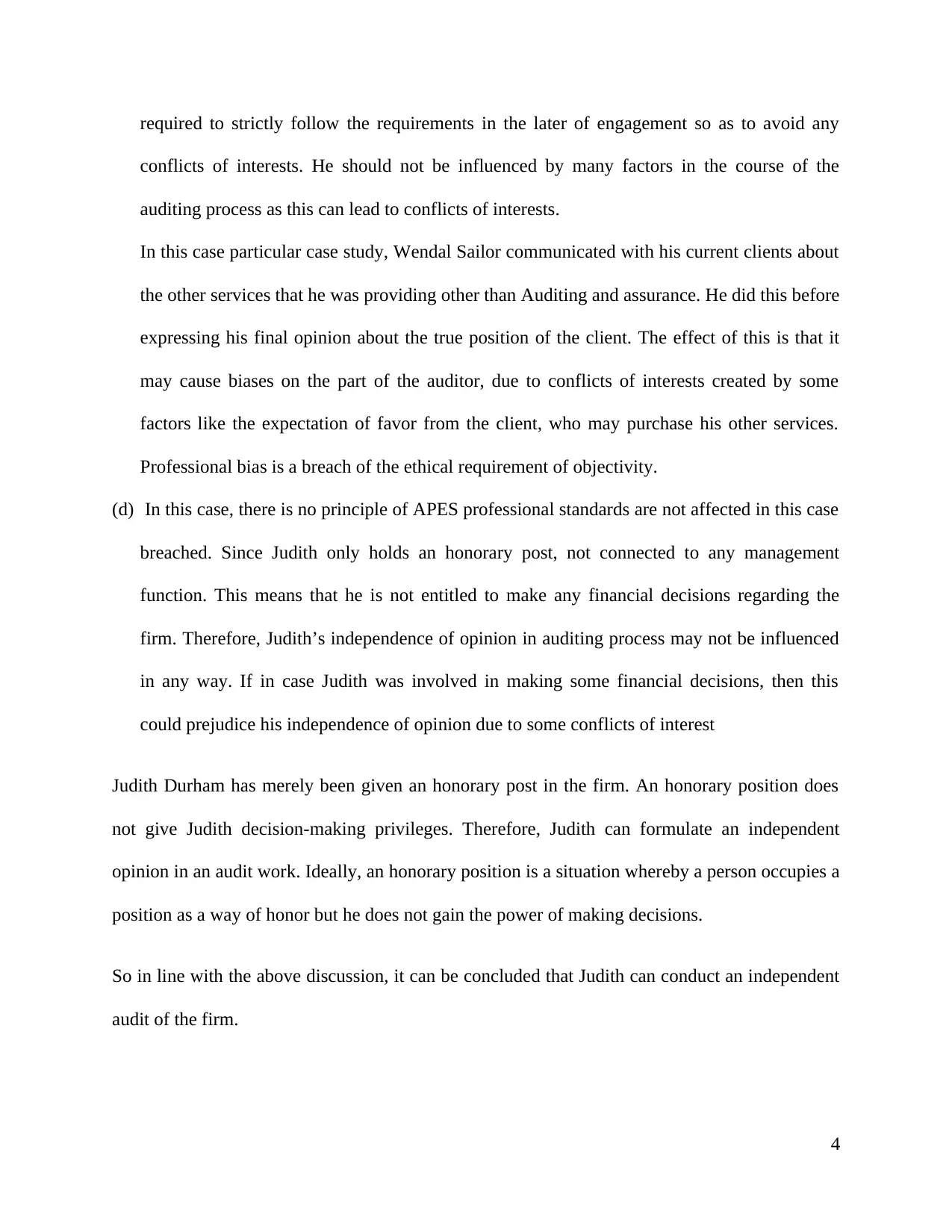
required to strictly follow the requirements in the later of engagement so as to avoid any
conflicts of interests. He should not be influenced by many factors in the course of the
auditing process as this can lead to conflicts of interests.
In this case particular case study, Wendal Sailor communicated with his current clients about
the other services that he was providing other than Auditing and assurance. He did this before
expressing his final opinion about the true position of the client. The effect of this is that it
may cause biases on the part of the auditor, due to conflicts of interests created by some
factors like the expectation of favor from the client, who may purchase his other services.
Professional bias is a breach of the ethical requirement of objectivity.
(d) In this case, there is no principle of APES professional standards are not affected in this case
breached. Since Judith only holds an honorary post, not connected to any management
function. This means that he is not entitled to make any financial decisions regarding the
firm. Therefore, Judith’s independence of opinion in auditing process may not be influenced
in any way. If in case Judith was involved in making some financial decisions, then this
could prejudice his independence of opinion due to some conflicts of interest
Judith Durham has merely been given an honorary post in the firm. An honorary position does
not give Judith decision-making privileges. Therefore, Judith can formulate an independent
opinion in an audit work. Ideally, an honorary position is a situation whereby a person occupies a
position as a way of honor but he does not gain the power of making decisions.
So in line with the above discussion, it can be concluded that Judith can conduct an independent
audit of the firm.
4
conflicts of interests. He should not be influenced by many factors in the course of the
auditing process as this can lead to conflicts of interests.
In this case particular case study, Wendal Sailor communicated with his current clients about
the other services that he was providing other than Auditing and assurance. He did this before
expressing his final opinion about the true position of the client. The effect of this is that it
may cause biases on the part of the auditor, due to conflicts of interests created by some
factors like the expectation of favor from the client, who may purchase his other services.
Professional bias is a breach of the ethical requirement of objectivity.
(d) In this case, there is no principle of APES professional standards are not affected in this case
breached. Since Judith only holds an honorary post, not connected to any management
function. This means that he is not entitled to make any financial decisions regarding the
firm. Therefore, Judith’s independence of opinion in auditing process may not be influenced
in any way. If in case Judith was involved in making some financial decisions, then this
could prejudice his independence of opinion due to some conflicts of interest
Judith Durham has merely been given an honorary post in the firm. An honorary position does
not give Judith decision-making privileges. Therefore, Judith can formulate an independent
opinion in an audit work. Ideally, an honorary position is a situation whereby a person occupies a
position as a way of honor but he does not gain the power of making decisions.
So in line with the above discussion, it can be concluded that Judith can conduct an independent
audit of the firm.
4
Paraphrase This Document
Need a fresh take? Get an instant paraphrase of this document with our AI Paraphraser
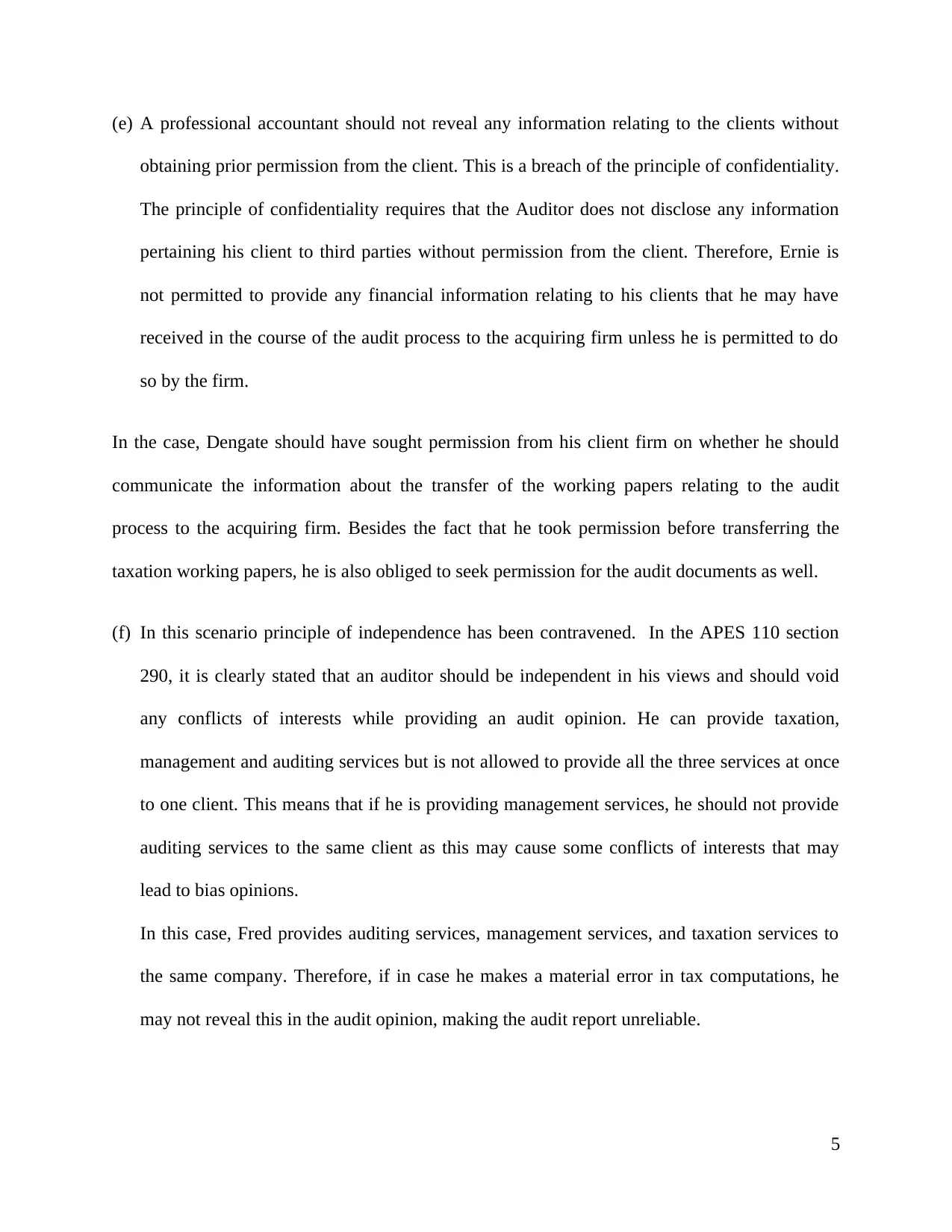
(e) A professional accountant should not reveal any information relating to the clients without
obtaining prior permission from the client. This is a breach of the principle of confidentiality.
The principle of confidentiality requires that the Auditor does not disclose any information
pertaining his client to third parties without permission from the client. Therefore, Ernie is
not permitted to provide any financial information relating to his clients that he may have
received in the course of the audit process to the acquiring firm unless he is permitted to do
so by the firm.
In the case, Dengate should have sought permission from his client firm on whether he should
communicate the information about the transfer of the working papers relating to the audit
process to the acquiring firm. Besides the fact that he took permission before transferring the
taxation working papers, he is also obliged to seek permission for the audit documents as well.
(f) In this scenario principle of independence has been contravened. In the APES 110 section
290, it is clearly stated that an auditor should be independent in his views and should void
any conflicts of interests while providing an audit opinion. He can provide taxation,
management and auditing services but is not allowed to provide all the three services at once
to one client. This means that if he is providing management services, he should not provide
auditing services to the same client as this may cause some conflicts of interests that may
lead to bias opinions.
In this case, Fred provides auditing services, management services, and taxation services to
the same company. Therefore, if in case he makes a material error in tax computations, he
may not reveal this in the audit opinion, making the audit report unreliable.
5
obtaining prior permission from the client. This is a breach of the principle of confidentiality.
The principle of confidentiality requires that the Auditor does not disclose any information
pertaining his client to third parties without permission from the client. Therefore, Ernie is
not permitted to provide any financial information relating to his clients that he may have
received in the course of the audit process to the acquiring firm unless he is permitted to do
so by the firm.
In the case, Dengate should have sought permission from his client firm on whether he should
communicate the information about the transfer of the working papers relating to the audit
process to the acquiring firm. Besides the fact that he took permission before transferring the
taxation working papers, he is also obliged to seek permission for the audit documents as well.
(f) In this scenario principle of independence has been contravened. In the APES 110 section
290, it is clearly stated that an auditor should be independent in his views and should void
any conflicts of interests while providing an audit opinion. He can provide taxation,
management and auditing services but is not allowed to provide all the three services at once
to one client. This means that if he is providing management services, he should not provide
auditing services to the same client as this may cause some conflicts of interests that may
lead to bias opinions.
In this case, Fred provides auditing services, management services, and taxation services to
the same company. Therefore, if in case he makes a material error in tax computations, he
may not reveal this in the audit opinion, making the audit report unreliable.
5
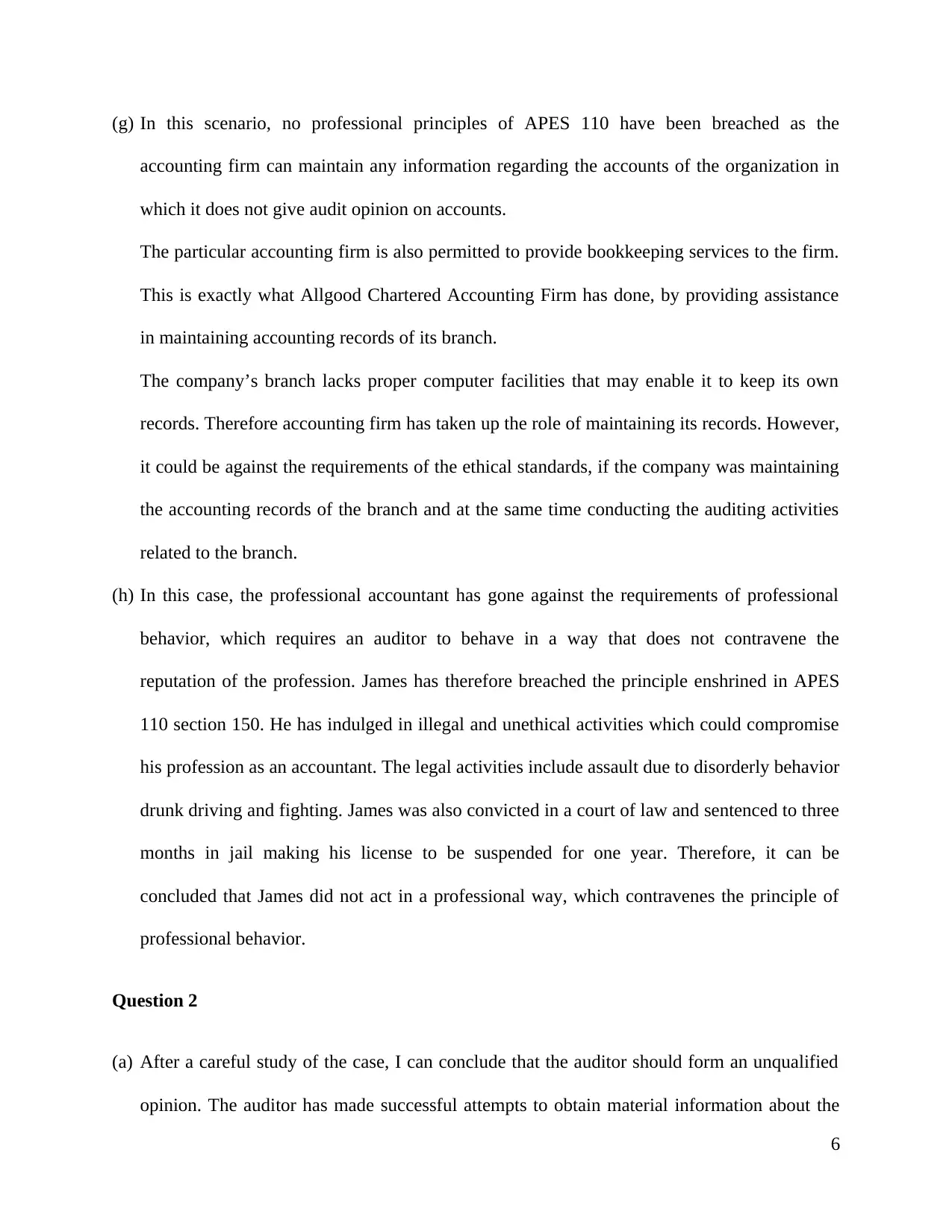
(g) In this scenario, no professional principles of APES 110 have been breached as the
accounting firm can maintain any information regarding the accounts of the organization in
which it does not give audit opinion on accounts.
The particular accounting firm is also permitted to provide bookkeeping services to the firm.
This is exactly what Allgood Chartered Accounting Firm has done, by providing assistance
in maintaining accounting records of its branch.
The company’s branch lacks proper computer facilities that may enable it to keep its own
records. Therefore accounting firm has taken up the role of maintaining its records. However,
it could be against the requirements of the ethical standards, if the company was maintaining
the accounting records of the branch and at the same time conducting the auditing activities
related to the branch.
(h) In this case, the professional accountant has gone against the requirements of professional
behavior, which requires an auditor to behave in a way that does not contravene the
reputation of the profession. James has therefore breached the principle enshrined in APES
110 section 150. He has indulged in illegal and unethical activities which could compromise
his profession as an accountant. The legal activities include assault due to disorderly behavior
drunk driving and fighting. James was also convicted in a court of law and sentenced to three
months in jail making his license to be suspended for one year. Therefore, it can be
concluded that James did not act in a professional way, which contravenes the principle of
professional behavior.
Question 2
(a) After a careful study of the case, I can conclude that the auditor should form an unqualified
opinion. The auditor has made successful attempts to obtain material information about the
6
accounting firm can maintain any information regarding the accounts of the organization in
which it does not give audit opinion on accounts.
The particular accounting firm is also permitted to provide bookkeeping services to the firm.
This is exactly what Allgood Chartered Accounting Firm has done, by providing assistance
in maintaining accounting records of its branch.
The company’s branch lacks proper computer facilities that may enable it to keep its own
records. Therefore accounting firm has taken up the role of maintaining its records. However,
it could be against the requirements of the ethical standards, if the company was maintaining
the accounting records of the branch and at the same time conducting the auditing activities
related to the branch.
(h) In this case, the professional accountant has gone against the requirements of professional
behavior, which requires an auditor to behave in a way that does not contravene the
reputation of the profession. James has therefore breached the principle enshrined in APES
110 section 150. He has indulged in illegal and unethical activities which could compromise
his profession as an accountant. The legal activities include assault due to disorderly behavior
drunk driving and fighting. James was also convicted in a court of law and sentenced to three
months in jail making his license to be suspended for one year. Therefore, it can be
concluded that James did not act in a professional way, which contravenes the principle of
professional behavior.
Question 2
(a) After a careful study of the case, I can conclude that the auditor should form an unqualified
opinion. The auditor has made successful attempts to obtain material information about the
6
⊘ This is a preview!⊘
Do you want full access?
Subscribe today to unlock all pages.

Trusted by 1+ million students worldwide
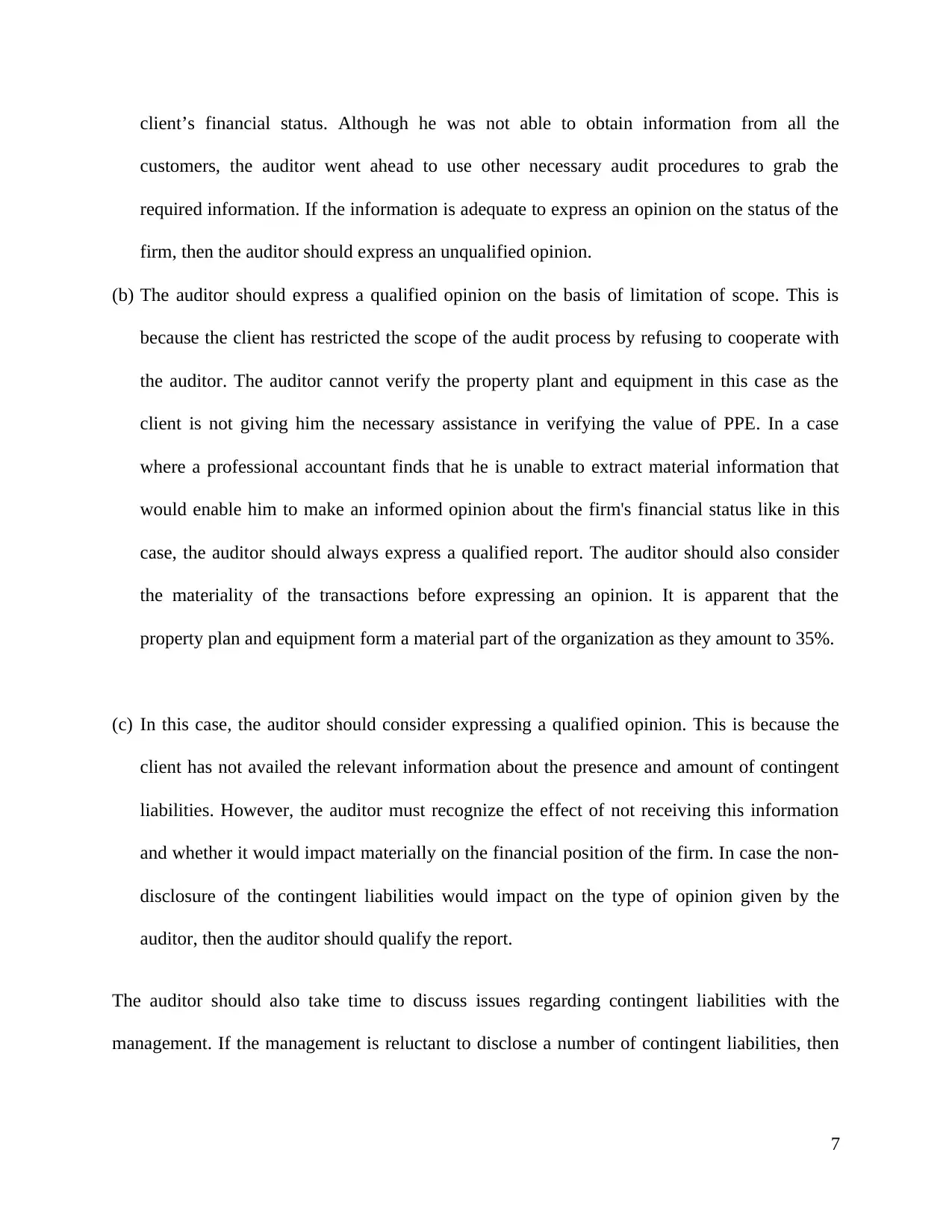
client’s financial status. Although he was not able to obtain information from all the
customers, the auditor went ahead to use other necessary audit procedures to grab the
required information. If the information is adequate to express an opinion on the status of the
firm, then the auditor should express an unqualified opinion.
(b) The auditor should express a qualified opinion on the basis of limitation of scope. This is
because the client has restricted the scope of the audit process by refusing to cooperate with
the auditor. The auditor cannot verify the property plant and equipment in this case as the
client is not giving him the necessary assistance in verifying the value of PPE. In a case
where a professional accountant finds that he is unable to extract material information that
would enable him to make an informed opinion about the firm's financial status like in this
case, the auditor should always express a qualified report. The auditor should also consider
the materiality of the transactions before expressing an opinion. It is apparent that the
property plan and equipment form a material part of the organization as they amount to 35%.
(c) In this case, the auditor should consider expressing a qualified opinion. This is because the
client has not availed the relevant information about the presence and amount of contingent
liabilities. However, the auditor must recognize the effect of not receiving this information
and whether it would impact materially on the financial position of the firm. In case the non-
disclosure of the contingent liabilities would impact on the type of opinion given by the
auditor, then the auditor should qualify the report.
The auditor should also take time to discuss issues regarding contingent liabilities with the
management. If the management is reluctant to disclose a number of contingent liabilities, then
7
customers, the auditor went ahead to use other necessary audit procedures to grab the
required information. If the information is adequate to express an opinion on the status of the
firm, then the auditor should express an unqualified opinion.
(b) The auditor should express a qualified opinion on the basis of limitation of scope. This is
because the client has restricted the scope of the audit process by refusing to cooperate with
the auditor. The auditor cannot verify the property plant and equipment in this case as the
client is not giving him the necessary assistance in verifying the value of PPE. In a case
where a professional accountant finds that he is unable to extract material information that
would enable him to make an informed opinion about the firm's financial status like in this
case, the auditor should always express a qualified report. The auditor should also consider
the materiality of the transactions before expressing an opinion. It is apparent that the
property plan and equipment form a material part of the organization as they amount to 35%.
(c) In this case, the auditor should consider expressing a qualified opinion. This is because the
client has not availed the relevant information about the presence and amount of contingent
liabilities. However, the auditor must recognize the effect of not receiving this information
and whether it would impact materially on the financial position of the firm. In case the non-
disclosure of the contingent liabilities would impact on the type of opinion given by the
auditor, then the auditor should qualify the report.
The auditor should also take time to discuss issues regarding contingent liabilities with the
management. If the management is reluctant to disclose a number of contingent liabilities, then
7
Paraphrase This Document
Need a fresh take? Get an instant paraphrase of this document with our AI Paraphraser
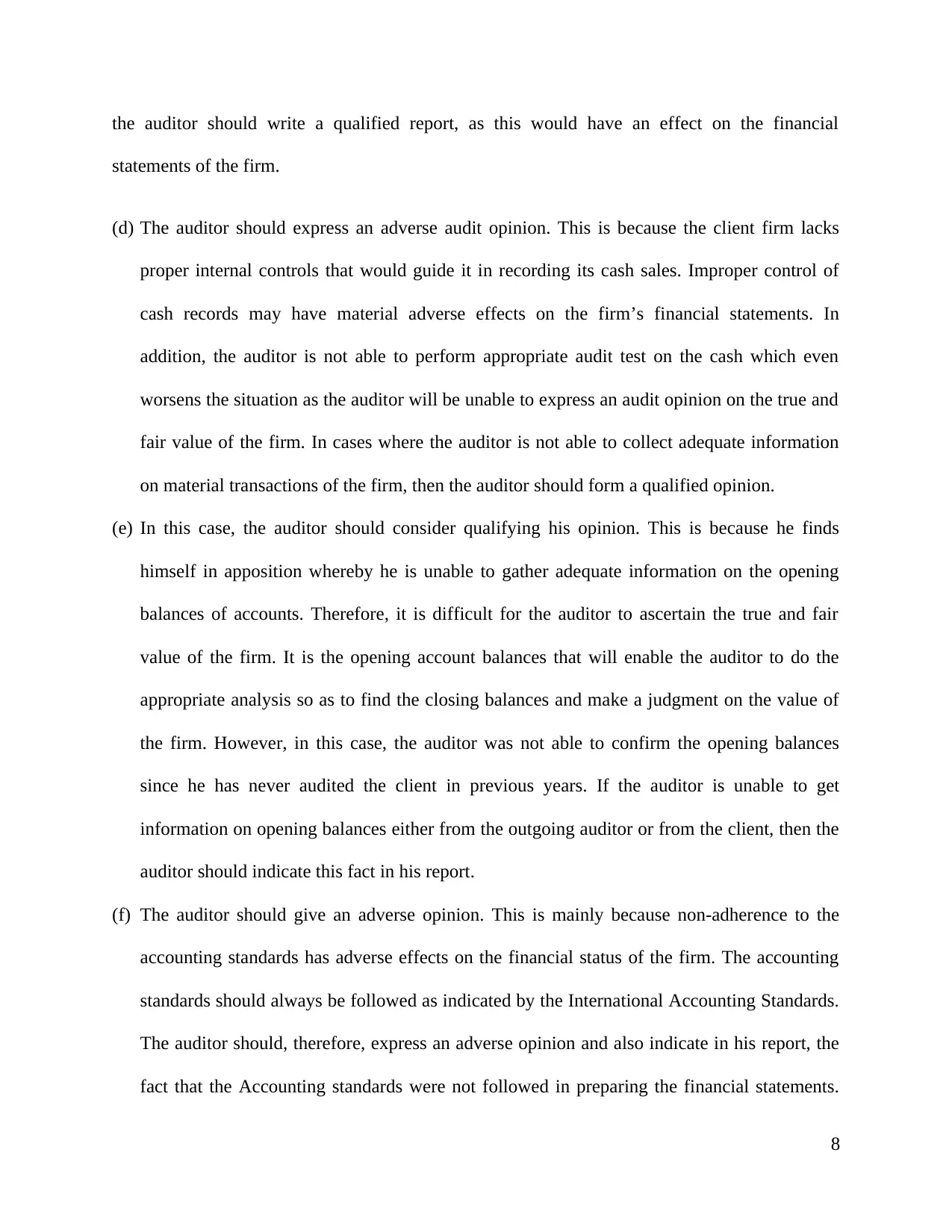
the auditor should write a qualified report, as this would have an effect on the financial
statements of the firm.
(d) The auditor should express an adverse audit opinion. This is because the client firm lacks
proper internal controls that would guide it in recording its cash sales. Improper control of
cash records may have material adverse effects on the firm’s financial statements. In
addition, the auditor is not able to perform appropriate audit test on the cash which even
worsens the situation as the auditor will be unable to express an audit opinion on the true and
fair value of the firm. In cases where the auditor is not able to collect adequate information
on material transactions of the firm, then the auditor should form a qualified opinion.
(e) In this case, the auditor should consider qualifying his opinion. This is because he finds
himself in apposition whereby he is unable to gather adequate information on the opening
balances of accounts. Therefore, it is difficult for the auditor to ascertain the true and fair
value of the firm. It is the opening account balances that will enable the auditor to do the
appropriate analysis so as to find the closing balances and make a judgment on the value of
the firm. However, in this case, the auditor was not able to confirm the opening balances
since he has never audited the client in previous years. If the auditor is unable to get
information on opening balances either from the outgoing auditor or from the client, then the
auditor should indicate this fact in his report.
(f) The auditor should give an adverse opinion. This is mainly because non-adherence to the
accounting standards has adverse effects on the financial status of the firm. The accounting
standards should always be followed as indicated by the International Accounting Standards.
The auditor should, therefore, express an adverse opinion and also indicate in his report, the
fact that the Accounting standards were not followed in preparing the financial statements.
8
statements of the firm.
(d) The auditor should express an adverse audit opinion. This is because the client firm lacks
proper internal controls that would guide it in recording its cash sales. Improper control of
cash records may have material adverse effects on the firm’s financial statements. In
addition, the auditor is not able to perform appropriate audit test on the cash which even
worsens the situation as the auditor will be unable to express an audit opinion on the true and
fair value of the firm. In cases where the auditor is not able to collect adequate information
on material transactions of the firm, then the auditor should form a qualified opinion.
(e) In this case, the auditor should consider qualifying his opinion. This is because he finds
himself in apposition whereby he is unable to gather adequate information on the opening
balances of accounts. Therefore, it is difficult for the auditor to ascertain the true and fair
value of the firm. It is the opening account balances that will enable the auditor to do the
appropriate analysis so as to find the closing balances and make a judgment on the value of
the firm. However, in this case, the auditor was not able to confirm the opening balances
since he has never audited the client in previous years. If the auditor is unable to get
information on opening balances either from the outgoing auditor or from the client, then the
auditor should indicate this fact in his report.
(f) The auditor should give an adverse opinion. This is mainly because non-adherence to the
accounting standards has adverse effects on the financial status of the firm. The accounting
standards should always be followed as indicated by the International Accounting Standards.
The auditor should, therefore, express an adverse opinion and also indicate in his report, the
fact that the Accounting standards were not followed in preparing the financial statements.
8
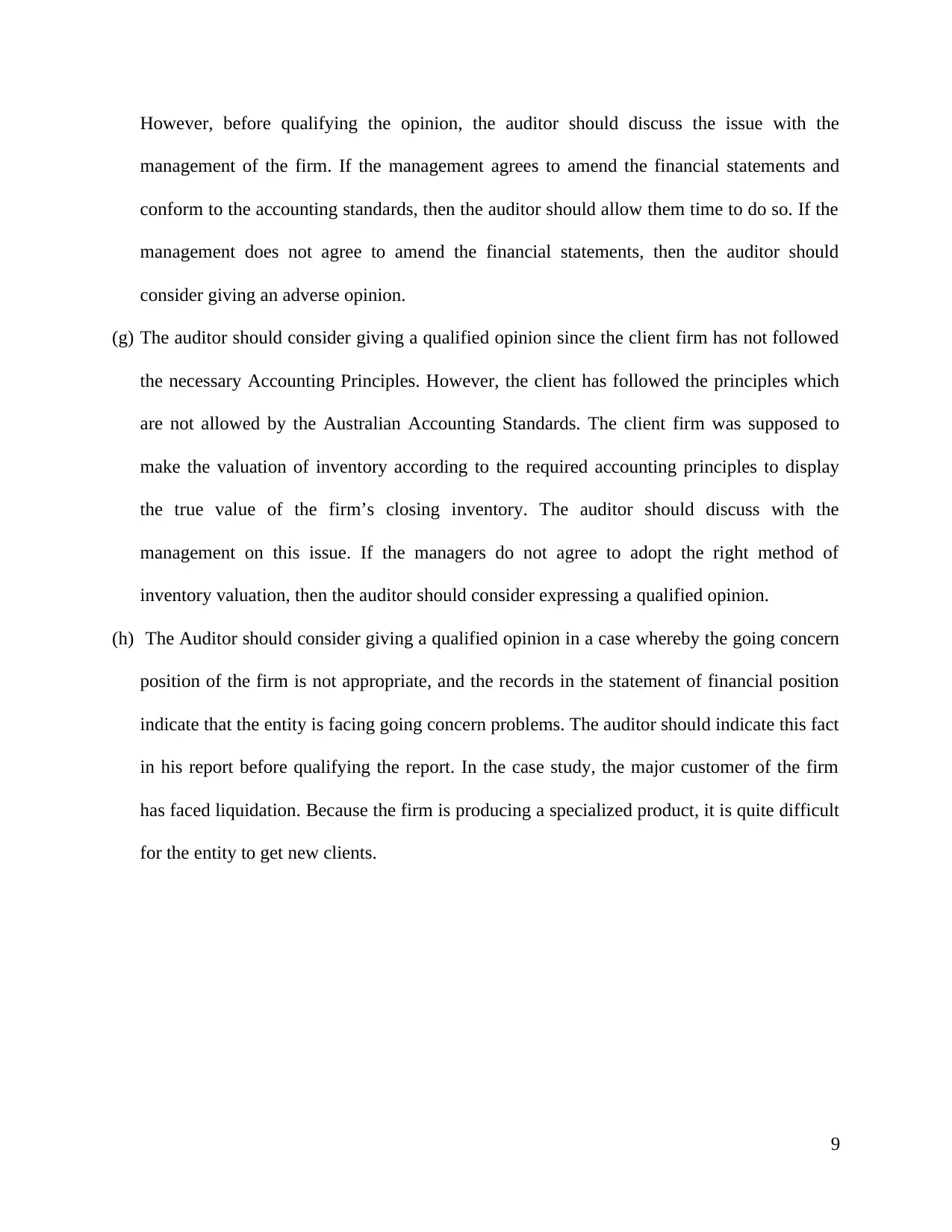
However, before qualifying the opinion, the auditor should discuss the issue with the
management of the firm. If the management agrees to amend the financial statements and
conform to the accounting standards, then the auditor should allow them time to do so. If the
management does not agree to amend the financial statements, then the auditor should
consider giving an adverse opinion.
(g) The auditor should consider giving a qualified opinion since the client firm has not followed
the necessary Accounting Principles. However, the client has followed the principles which
are not allowed by the Australian Accounting Standards. The client firm was supposed to
make the valuation of inventory according to the required accounting principles to display
the true value of the firm’s closing inventory. The auditor should discuss with the
management on this issue. If the managers do not agree to adopt the right method of
inventory valuation, then the auditor should consider expressing a qualified opinion.
(h) The Auditor should consider giving a qualified opinion in a case whereby the going concern
position of the firm is not appropriate, and the records in the statement of financial position
indicate that the entity is facing going concern problems. The auditor should indicate this fact
in his report before qualifying the report. In the case study, the major customer of the firm
has faced liquidation. Because the firm is producing a specialized product, it is quite difficult
for the entity to get new clients.
9
management of the firm. If the management agrees to amend the financial statements and
conform to the accounting standards, then the auditor should allow them time to do so. If the
management does not agree to amend the financial statements, then the auditor should
consider giving an adverse opinion.
(g) The auditor should consider giving a qualified opinion since the client firm has not followed
the necessary Accounting Principles. However, the client has followed the principles which
are not allowed by the Australian Accounting Standards. The client firm was supposed to
make the valuation of inventory according to the required accounting principles to display
the true value of the firm’s closing inventory. The auditor should discuss with the
management on this issue. If the managers do not agree to adopt the right method of
inventory valuation, then the auditor should consider expressing a qualified opinion.
(h) The Auditor should consider giving a qualified opinion in a case whereby the going concern
position of the firm is not appropriate, and the records in the statement of financial position
indicate that the entity is facing going concern problems. The auditor should indicate this fact
in his report before qualifying the report. In the case study, the major customer of the firm
has faced liquidation. Because the firm is producing a specialized product, it is quite difficult
for the entity to get new clients.
9
⊘ This is a preview!⊘
Do you want full access?
Subscribe today to unlock all pages.

Trusted by 1+ million students worldwide
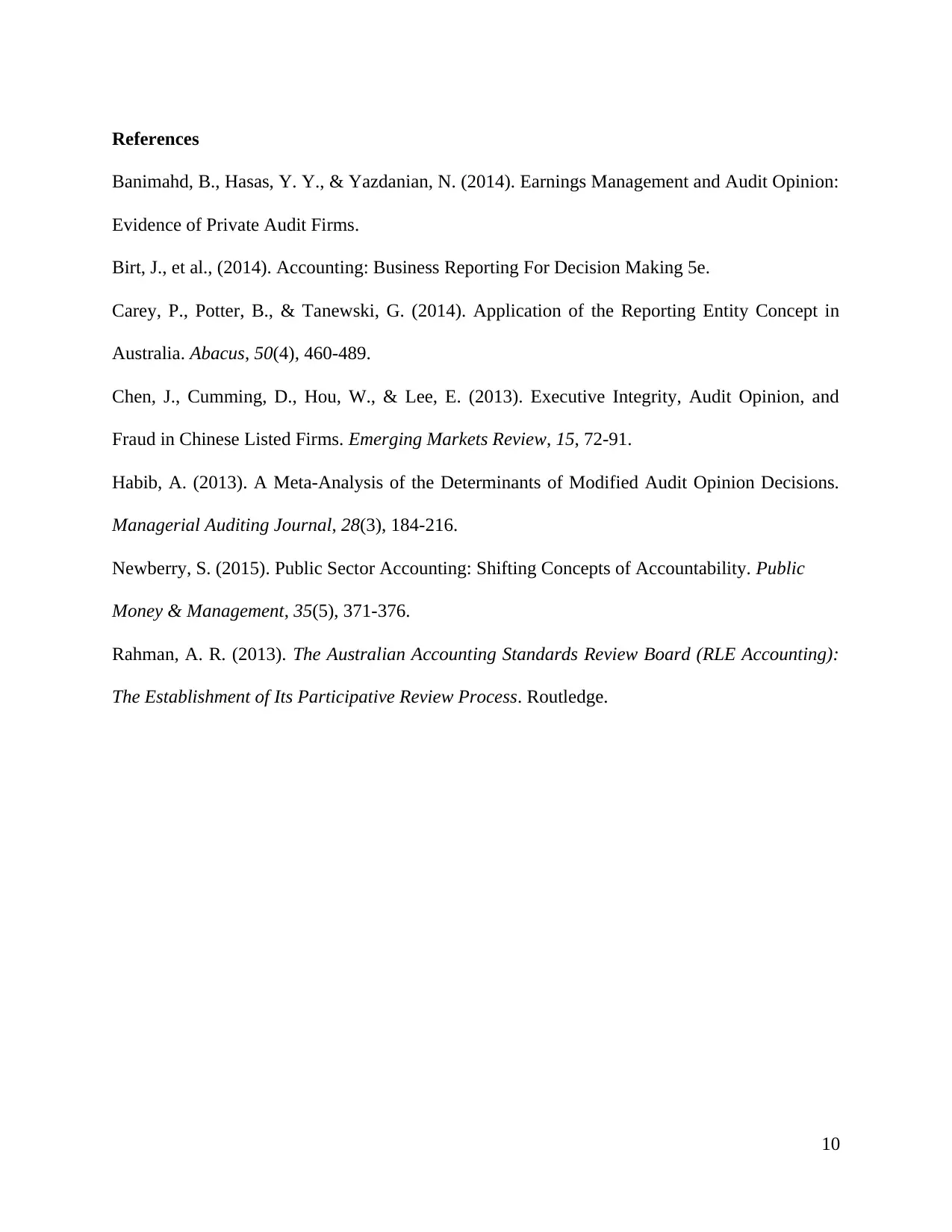
References
Banimahd, B., Hasas, Y. Y., & Yazdanian, N. (2014). Earnings Management and Audit Opinion:
Evidence of Private Audit Firms.
Birt, J., et al., (2014). Accounting: Business Reporting For Decision Making 5e.
Carey, P., Potter, B., & Tanewski, G. (2014). Application of the Reporting Entity Concept in
Australia. Abacus, 50(4), 460-489.
Chen, J., Cumming, D., Hou, W., & Lee, E. (2013). Executive Integrity, Audit Opinion, and
Fraud in Chinese Listed Firms. Emerging Markets Review, 15, 72-91.
Habib, A. (2013). A Meta-Analysis of the Determinants of Modified Audit Opinion Decisions.
Managerial Auditing Journal, 28(3), 184-216.
Newberry, S. (2015). Public Sector Accounting: Shifting Concepts of Accountability. Public
Money & Management, 35(5), 371-376.
Rahman, A. R. (2013). The Australian Accounting Standards Review Board (RLE Accounting):
The Establishment of Its Participative Review Process. Routledge.
10
Banimahd, B., Hasas, Y. Y., & Yazdanian, N. (2014). Earnings Management and Audit Opinion:
Evidence of Private Audit Firms.
Birt, J., et al., (2014). Accounting: Business Reporting For Decision Making 5e.
Carey, P., Potter, B., & Tanewski, G. (2014). Application of the Reporting Entity Concept in
Australia. Abacus, 50(4), 460-489.
Chen, J., Cumming, D., Hou, W., & Lee, E. (2013). Executive Integrity, Audit Opinion, and
Fraud in Chinese Listed Firms. Emerging Markets Review, 15, 72-91.
Habib, A. (2013). A Meta-Analysis of the Determinants of Modified Audit Opinion Decisions.
Managerial Auditing Journal, 28(3), 184-216.
Newberry, S. (2015). Public Sector Accounting: Shifting Concepts of Accountability. Public
Money & Management, 35(5), 371-376.
Rahman, A. R. (2013). The Australian Accounting Standards Review Board (RLE Accounting):
The Establishment of Its Participative Review Process. Routledge.
10
1 out of 10
Related Documents
Your All-in-One AI-Powered Toolkit for Academic Success.
+13062052269
info@desklib.com
Available 24*7 on WhatsApp / Email
![[object Object]](/_next/static/media/star-bottom.7253800d.svg)
Unlock your academic potential
Copyright © 2020–2026 A2Z Services. All Rights Reserved. Developed and managed by ZUCOL.





